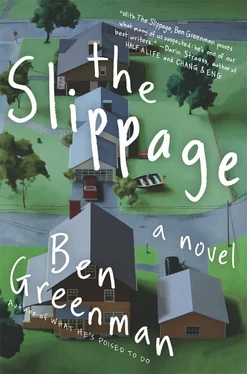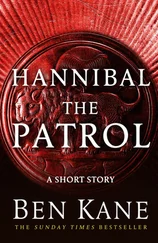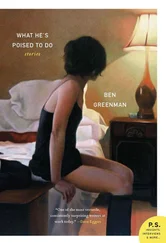She brought him water and he stood at the kitchen counter and drank it. Emma’s house was like his own — the floor plan was the same, bedrooms off to the right along a narrow hallway — and so he didn’t need to ask where the bathroom was or search for the niche with the garbage can in the kitchen. The differences came down to the accents: the fixtures in the guest bathroom (hers were better) or the sliding glass door that led outside (he won here).
“William,” Emma said from the bedroom. “Will you bring the big box in here?”
He went into the back of the house, turned left. “In here?” he said. He slid the box against the wall. The book she had been reading when she came to the door was on a table near the bed, title covered this time by a pair of sunglasses. He turned to find Emma blocking the door. She took his hand, put it on the center of her chest, and slid it down across her belly. A fact broke through the afternoon. “Go to the bed,” Emma said. He did, and watched as she swiftly popped the snaps on her shirt and unclasped her bra. The cups sat loose on the swell of her belly; her breasts were not much larger than he remembered, but they were darker at the nipples, harder to dispute. “Is there a reason you’re still dressed?” It was the same voice as in Chicago, but thinner; it was as if it had been stretched from there.
“I don’t have anything,” he said. “You know.” He made a circle with his thumb and middle finger.
“Haven’t you been paying attention? You can’t get pregnant on top of pregnant.” She covered the distance between them, eyes beginning to go liquid as she reached the bed. William had trusted her in Chicago, without any reason but her beauty. He had distrusted her at Gloria Fitch’s party for the same reason. That afternoon, in her house, he tried to make his peace with what he saw, buttons all undone, but it was too much for him; he was unable to do more than peel the fabric back to the hips and trace what was beneath. It worked for her but not for him, which worked for him.
Breaths weren’t words. They were more. He turned toward her when he heard them stop. “Shit,” she said, and he felt a surge of terror. “It’s two. We need to get my car.”
She dressed again, quickly, forgoing her bra, and he even sped a little on the way to the lot. They couldn’t find her car at first (“That’s because it’s beyond anonymous,” she said. “I don’t even know the plate number yet”) but she identified it by the rear passenger window, where there was a doll of a bear cub with suction cups on all four limbs. “It’s waving good-bye to you,” she said. “Go.”
William made it home in time for a quick shower, after which he put his work clothes back on and went to get Louisa. While he waited for her outside her office, he thought back, with some effort, to the first time they had met. The guys at the paper had talked about the new writer who’d been hired from a Dallas magazine, a woman who specialized in restaurants but had also done good work on municipal corruption. They had her name as Louise, and that made William imagine someone older, to the point where he didn’t even think to connect it to the tall brunette who was standing out in front of the building, squinting at the name plates, as he went out. He assumed she was there for the temp agency that shared the building and was surprised and a little embarrassed to return from lunch and find her in the small front lobby of the newspaper, filling out new-employee forms. What stayed with him most specifically was how she had folded her frame into one of the small uncomfortable lobby chairs and failed to meet his eye. Later, she claimed nerves, though nerves couldn’t explain the smile she directed down into her paperwork: sly, knowing, waiting him out.
“Funny that you were thinking of that,” Louisa said after she got into the car and asked him why he looked like he was a million miles away. “Guess who called me today?”
“Me, but from the past?”
“Now that’s a long-distance call,” she said. She folded and unfolded her hands brightly. “No. It was Jim. He’s going to be in town in a few weeks. The usual drill: business, one night off, wanted to know if we could meet him and his wife for dinner or drinks.”
“Sure,” he said. “I don’t see why not. Just tell me when.”
They passed a fire truck going the other way, and when he turned onto their street he jerked his head up to signal that he had just recovered a recent memory. “Oh,” he said. “I talked to our new neighbor today. She was getting into her car. She looked like she was expecting. Or maybe fat.”
“That’s nice,” Louisa said.
“Is it?” he said. “That’s all we need: another kid in the neighborhood.” She turned away in hurt. Her injury was his protection.
William was loading dry cleaning into the back seat of his car when he noticed Tom’s Charger parked alongside a sagging Cadillac. A chunk of Tom’s grille hung like a loose tooth. William peeked into windows. He didn’t see Tom in the barbershop or the grocery. He was about to give up when he heard a tapping noise that summoned him to the Chinese restaurant in the corner of the mall. He pressed a hand to the window for shade. Tom tapped the window again with his chopsticks and motioned William inside.
A chair was already pulled out. “Sit,” Tom said. He was unshaven, or at least unevenly shaven. On the table in front of him there was a bowl of white rice, a pair of empty beer bottles, and a plate with the remnants of something glutinous. “Chicken, I think,” Tom said when he saw William looking. “Pork? Whatever it was, it wasn’t very good.” He shoveled rice into his mouth like he was stoking a coal car.
William hung his jacket on the back of a chair. “They asked for you at the Fitches’.”
“Like I said, busy.” Tom tugged on his own ear. Giving the sign to steal, William and Louisa used to joke when they saw someone gesturing like that.
“I keep waiting for you to call in that favor.”
“Keep waiting.” He slashed a finger across his throat. William wasn’t sure what he was killing. “Something else is hatching. A woman, the mother of one of my students, called me. She went with her daughter to the show and she wanted to meet me.”
“She’s a groupie?”
“No,” he said. “A publisher. She wants to do a book of the graphs.” He scowled on the nouns.
“Sounds terrible,” William said. “Someone likes what you do. I feel for you.”
“That’s not it at all,” Tom said. Grains of rice plummeted from his chopsticks. “I don’t know if I want my work in a book. It’s like a sealed cube with mirrors on the inside.”
“People open books up. They read them.”
“Maybe I’m wrong to be fixating on the book. Maybe it’s more about this woman. You should have heard the tone of her voice, like she’d just found the thing of value that was going to move her forward in her career.”
“Maybe she did,” William said. “Why is that a problem if you’re the thing of value?”
“You understand even if you say you don’t,” Tom said. “She’s just doing what all ants do, which is to go on up the anthill. You can’t stop them. You shouldn’t even try. What you can do is prevent yourself from wondering what a man should never wonder, which is whether you’ve already gone up the anthill and come back down.” Outside the window, a car alarm began to chirp. “Damn it,” Tom said, pounding the table hard enough to rattle the beer bottles. “That thing’s been going off every ten minutes for the last two hours.”
“How long have you been sitting here?” William said.
Tom wasn’t listening. “What about these fires, Billy Boy? People are whispering that they’re being set on purpose. We were right there. We could have seen the perpetrator stealing away.”
Читать дальше












